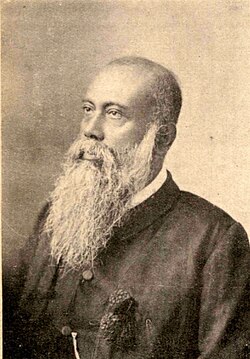Brajendra Nath Seal
Brajendra Nath Seal | |
|---|---|
 Brajendra Nath Seal | |
| Born | 3 September 1864 |
| Died | 3 December 1938 Calcutta, British India |
| Nationality | Indian |
| Occupation | Philosopher |
Sir Brajendra Nath Seal (Bengali: ব্রজেন্দ্রনাথ শীল; 3 September 1864 – 3 December 1938) was a Bengali Indian humanist philosopher.[1][2] He served as the second vice chancellor of Mysore University.
Life[edit | edit source]
Brajendranath Seal was born in Haripal, Hoogly District (in West Bengal), in 1864. His father Mohendranath Seal was one of the earliest followers of Comtean positivism in Bengal. As a student of philosophy at the General Assembly's Institution (now Scottish Church College, Calcutta), he became attracted to Brahmo theology. And along with his better-known classmate and friend Narendranath Dutta, the future Swami Vivekananda, he regularly attended meetings of the Sadharan Brahmo Samaj. Later they would part ways with Dutta aligning himself with Keshub Chunder Sen's New Dispensation (and later on to found his own religious movement, the Ramakrishna Mission) and Seal staying on as an initiated member.[citation needed]
Seal was the inaugural chair of philosophy at India's first graduate school in philosophy at the University of Calcutta.[3] Seal was regarded as 'a versatile scholar in many branches of learning, both scientific and humanistic,' and in his major work The Positive Sciences of Ancient Hindus demonstrated 'interrelations among the ancient Hindu philosophical concepts and their scientific theories.'[3] He was appointed as the principal of Krishnath College in Berhampore.[4][5]
Seal was the keynote speaker at the first session of the First Universal Races Congress of 1911 on 26 July 1911, which gathered speakers and attendees from across the world to discuss racial issues and encourage international cooperation. Part of his address included the declaration that
We are assisting at a solemn function, the conferring of a new charter, the charter of the modern conscience, on each race and nation as a member of the world-system.... From this watch-tower of Humanity, we seem to hear the measureless tread of generations behind and before, to witness the universal march and procession of Humanity, at the opening of a new era...[6]
Michael Biddiss notes that Seal's opening words 'set the tone of effusion and euphoria' which pervaded much of the Congress as a whole.[6] Seal served as the vice chancellor of Mysore University from 1921 and retired in 1930 following a paralytic stroke.[7]
Books[edit | edit source]
- A Memoir on the Co-efficient of Numbers: A Chapter on the Theory of Numbers (1891)
- Neo-Romantic Movement in Bengali Literature (1890–91)
- A Comparative Study of Christianity and Vaishnavism (1899)
- New Essays in Criticism (1903)
- Introduction to Hindu Chemistry (1911)
- Positive Sciences of the Ancient Hindus (1915)
- Race-Origin (1911)
- Syllabus of Indian Philosophy (1924)
- Rammohan Roy: The Universal Man (1933)
- The Quest Eternal (1936)
References[edit | edit source]
- ↑ "Seal, Brajendra Nath - Banglapedia". en.banglapedia.org. Retrieved 17 September 2020.
- ↑ "Brajendra Nath Seal (1864-1938), by William Sweet". people.stfx.ca. Retrieved 17 September 2020.
- ↑ 3.0 3.1 "Indian philosophy - 19th- and 20th-century philosophy in India and Pakistan". Encyclopedia Britannica. Retrieved 17 September 2020.
- ↑ "V. Notices of Books - A Memoir on the Coefficients of Numbers. Being a Chapter in the Theory of Numbers. By Brajendranath Seal, M.A., Principal Berhampore College, Bengal. (Calcutta, Hare Press, 1891.)". Journal of the Royal Asiatic Society. 24 (2): 397. April 1892. doi:10.1017/S0035869X00021857. ISSN 2051-2066.
- ↑ The Calcutta Review. 1888.
- ↑ 6.0 6.1 Biddiss, Michael D. (1 July 1971). "The Universal Races Congress of 1911". Race. 13 (1): 37–46. doi:10.1177/030639687101300103. S2CID 143076765 – via Sage Journals.
- ↑ Gupta, Sujata; Gupta, Prabir K.; Gupta, Supratim (2014). "Brajendra Nath Seal – a sesquicentenary birth anniversary tribute". Current Science. 106 (5): 760–762. ISSN 0011-3891.
- Kopf, David. 1979. The Brahmo Samaj and the Shaping of the Modern Indian Mind. Princeton, NJ. Princeton University Press
- Scottish Church College Magazine (Year – 1999, 2000, and 2001.Volume – 87, 88, and 89).
External links[edit | edit source]
- William Sweet (2003), About Brajendra Nath Seal
- Roy, Pradip Kumar (2012). "Seal, Brajendra Nath". In Islam, Sirajul; Jamal, Ahmed A. (eds.). Banglapedia: National Encyclopedia of Bangladesh (Second ed.). Asiatic Society of Bangladesh.
- ICHHIMUDDIN SARKAR, Acharya Brajendra Nath Seal’s Insights on Spiritualism and Humanity: Exposition and Reality, Tawarikh (International Journal for Historic Studies), Vol 8, No. 1(2016)
- Pages using Lang-xx templates
- Articles with unsourced statements from May 2021
- 1864 births
- 1938 deaths
- Scottish Church College alumni
- Bengali male poets
- Brahmos
- Indian male essayists
- 19th-century Indian historians
- Indian male poets
- 19th-century Indian philosophers
- Knights Bachelor
- Indian knights
- People associated with Santiniketan
- Writers from Kolkata
- University of Calcutta alumni
- University of Calcutta faculty
- University of Mysore faculty
- 19th-century Indian educational theorists
- City College, Kolkata faculty
- Bengali writers
- Bengali philosophers
- 19th-century Indian essayists
- 20th-century Indian philosophers
- Scientists from Kolkata
- 20th-century Indian essayists
- 20th-century Indian poets
- 19th-century Indian poets
- 20th-century Indian historians
- 19th-century Indian male writers
- 20th-century Indian educational theorists
- Scholars from Kolkata
- Neo-Vedanta
